Issue Number 61, Summer 2023
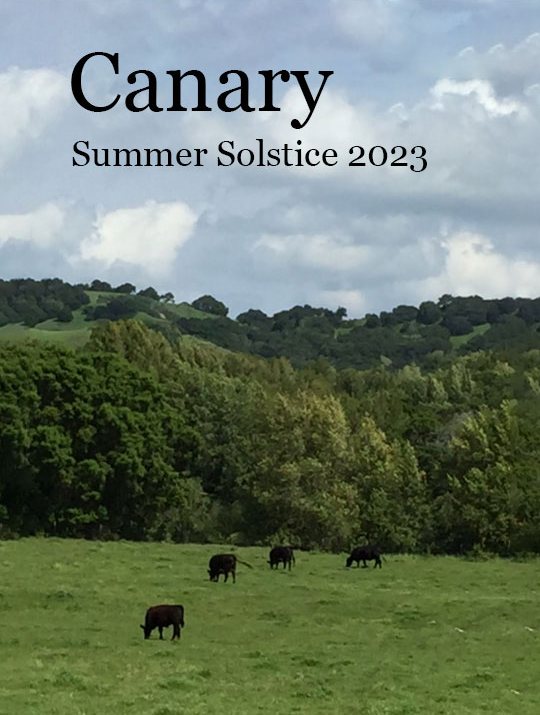
Contents
- Plenty by Dion O'Reilly
- Dispatch from the West by Dion O'Reilly
- A Map of Australia by John Glowney
- Burning Down the House by John Glowney
- An Inkling, An Urgency, A Patience by Tricia Knoll
- The Record Heat Wave in Portland, Oregon by Tricia Knoll
- There, something! by D.S. Maolalai
- On Deck by Gene Berson
- Night is Learning to Swim by Grace Marie Grafton
- You Have Housed Your Longing by Grace Marie Grafton
- Symbiosis by John Schneider
- Mirror Lake by Phil Harford
- Trail of the Monarchs by Daniel Brennan
- Ode to the Little Brown Bat (myotis lucifigas) by Joan Mazza
- Brigid, Earthbound by Jenevieve Carlyn Hughes
- Rise, Shine by Ellen Roberts Young
- All Used Up by Maria Zafonte
- As Long As We Have Windows by Zeke Shomler
- Finding the Solace Outside by Cynthia Edmonds-Cady
- Being There by Ronald J. Pelias
- Idyll by Regina Weiss
- Mandy Finds Her Place by Wren Tuatha
- Cardinal by Christine Gentry
Archives: by Issue | by Author Name

Plenty
by Dion O'Reilly
Dion lives in the Soquel Creek watershed on a stream-cut terrace covered with a thin mantle of alluvium on a ten-acre triangular plot between Soquel Creek and its tributary, Love Creek.

August, the last of the apricots
haunts the trees. Their furred skins, split,
rotten and dangerous, crawling
with stingers on the unseen
side of the globes.
Above me, buzzards tilt in the heat.
Do they miss the condors?
The stiff keratin of the bigger beak
to splay a corpse’s flanks, break it
for a weaker brother.
I heard we once crept
behind hyenas, cracked
the bones of their leavings,
squatted and sucked the soft insides.
So many ghosts shimmer
the sky, shiver the leaves—
all the helpmates, swarms
of the world, whispering,
Let me feed my hunger first—
then you.
First published in Salamander.
© Dion O'Reilly

Dispatch from the West
by Dion O'Reilly
Dion lives in the Soquel Creek watershed on a stream-cut terrace covered with a thin mantle of alluvium on a ten-acre triangular plot between Soquel Creek and its tributary, Love Creek.

It’s fire time again.
So far so good.
Fog in the mornings
Erases the trees.
Shafts of sunlight
Break up the mist,
All of it, the same.
All of it, waiting.
Nothing for my diary.
Just records broken
Far to the north—
A heat dome like a dome
Of silence, but no one’s
Getting smart.
I admit it, I’m terrified,
Terrified of the hungry air
Taking back the slugs,
Earth and sky making
God-love as my house collapses.
I stare out the window, a black cat
Likes my meadow, sits
On the sidelines. Watches
The quail tilt their nervous hats,
Whirl to the bosky creek.
Nothing’s forgiven. Nothing’s forgotten.
Not last winter’s rain, too soft
To snuff the smoldering roots.
Not the roll cloud’s belly,
Pricking snags into flame.
For now, let’s praise
The cold Pacific.
Still cold. Oh Lord, still cold.
It lays its mist hand on me.
Says Quiet. Quiet!
Stop it. Be still.
First published in Topical.
© Dion O'Reilly
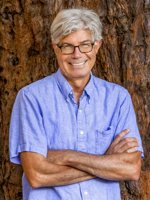
A Map of Australia
by John Glowney
John lives close to the shores of Lake Washington, a ribbon lake formed by the southern flow of the Puget lobe of the Cordilleran Ice Sheet near the end of the Late Pleistocene, looking out at Mt. Rainier, an active stratovolcano in the Cascade Volcanic Arc.

Hellish beauty--a map so crowded with fire
symbols they look like mushrooms
bunched along a tree root, or little geisha fans,
guitar picks, fish scales--red and yellow
clusters trimming a continent
with a ruffle of flame. A billion dead
animals littered over char, and abstracted
this way means I can’t actually see
the carcasses but they say they are
saving a few: arboreal koalas, evicted
from eucalypt woodlands, wallabies,
of the Macropodidae family,
as are the singed kangaroos, marsupials,
the big jacks
with their long limbs bound and taped
like a prize fighter’s hands.
I can’t bear to look at them, anyway,
the cattle lying down in the smoke,
the glossy black cockatoo,
the Wollemi pines, conifers really,
secret canyon of stragglers, Lazarus
taxa, diaspora of the Cretaceous,
the ashy small towns, the panic-
stricken mothers on the beach,
hurrying to snatch up the smallest
children, rushing into the surf,
into rowboats. They are all
so out of place, the shelters
collecting handmade
joey pouches, all these wild things,
in the arms of medics,
or volunteers,
or the cold, frantic sea.
© John Glowney

Burning Down the House
by John Glowney
John lives close to the shores of Lake Washington, a ribbon lake formed by the southern flow of the Puget lobe of the Cordilleran Ice Sheet near the end of the Late Pleistocene, looking out at Mt. Rainier, an active stratovolcano in the Cascade Volcanic Arc.

our house-
plants, their daily seances
in our rooms, their hours
and hours of meditative
poses. They have feelings,
my daughter tells me, young enough
to know. School-children
retrofit fish tanks into terrariums
for caterpillars, pill-bugs,
a grass-hopper. Old growth forests
change themselves into shadows.
The children bring more twigs and leaves.
*
The butcher works his messy
knife, frees the heart,
liver, lungs, kidneys, the chuck, the shank,
rib, round, flank.
What cannot be eaten?
Duck soup, caviar,
chicken feet, gizzards. Haggis, sheep’s head.
Blood sausages, escargot, shark fin soup.
Rocky Mountain oysters. Calf brain, served
with tongue, sautéed with beurre noir
and capers—
*
The mansions of the Amazon are burning
Palm oil tears.
The mansions of the Amazon are burning
So much smoke
you can no longer see the jaguar, the gorilla,
the poison dart frog, hyacinth macaw,
golden-lion tamarind, the three-toed sloth.
The mansions of the Amazon are burning
The village roosters call out the names
of every dew-drop.
The mansions of the Amazon are burning
© John Glowney

An Inkling, An Urgency, A Patience
by Tricia Knoll
Tricia lives in the Vermont woods on unceded lands of the Western Abenaki people.

The big word today is resilience,
hoisted like a banner to flap in dry wind
of drought. Having lost this or that squared,
let us encourage the persistence of those.
In a kibbutz a man tastes the first Judaean date
grown since the time of Jesus from seeds
found in a desert wilderness. Sweetness
unlike any other date grown today.
He calls this agricultural archaeology.
Taste lost, restored. I might call it magic.
Or wisdom old as dirt. In the seeds
an inkling, an urgency, a patience.
Sequoias burn. New ones sprout.
If we are not here to see their grandeur,
the soil may know or the squirrels.
They may burn again.
Winds whip us. Heat scorches.
Seas flood. This drought cracks us.
Beside my whisk broom, the spider
scurries to a crack I cannot see.
Inkling. Urgency. Patience.
Perhaps a gentle hand will help.
Perhaps not.
That is all I know of persistence.
© Tricia Knoll

The Record Heat Wave in Portland, Oregon
by Tricia Knoll
Tricia lives in the Vermont woods on unceded lands of the Western Abenaki people.

sat flat on us, hot water in our birdbath,
no waves. A high-altitude north wind
swept smoke and ash down from BC wildfires
at Carp Lake, Dawson Creek, White River,
Battle Mountain and End of Sun Glow.
To waft this far – to open up dawn
with mist that is not mist.
We who watch ferns curl
and rose petals fall to pieces
know this is new. Pundits warn
not to breathe the sky, worse
than Shanghai. We mutter advice
on hydration, elder care, oscillating
fans, learn the sociology of heat islands –
that tents by freeways are not shelters.
Sunset smothers down in smears of apricot.
Unseen, high in spruces the crows pant.
© Tricia Knoll

There, something!
by D.S. Maolalai
D.S. lives in a small city on an island in the Atlantic, just off the European coast and in an apartment overlooking a sluggish grey river, surrounded on all sides by seagulls.

just down around dawn. the south
circular road. near camden st, near
to the river. the world being textured
by oblique slanting rafters
of sun striking sideways
and leaning on everything's
stubble. no traffic so early,
but a rabbit was there – yes –
coming down out of somebody's
garden. the morning was quiet, its nose
twitched in chewed over lungfuls like half idle
fingers, shuffling through record
collections. I stood still – there,
something! something novel in context,
you know? my apartment was just
a few road-crossings backways,
it was where I was coming from, and this
was a rabbit, a real life wild
animal, some woodgrain-
brown fur on a body. it could
have been god's face for how much
it mattered, and how much it felt
like it meant. and then a man passing
and the rabbit awayed. and then
the day happened, and the rest of it.
© D.S. Maolalai

On Deck
by Gene Berson
Gene lives in the northern California foothills in the Yuba River watershed. Everyone goes to the river. Like a temple, with its falls its rapids its green pools, it seems to restore everyone in a personal way. We feel our kinship through it.

The boatload of Libyan refugees
who had hoped to escape bewildering slaughter
were drowned, perhaps on purpose
—eighteen year-olds
desperately fleeing to live.
Dawn revealed
their bodies, floating apart, stiff arms reaching
on the reliable tide, the previous day’s screams
replaced by a sky full of excited gulls.
I turn off the TV, go outside
start sweeping leaves from the deck
layered six inches thick
crisp as potato chips.
Heavy rains this spring, double the average
caused a mold so the oak leaves
are dropping early, stressing the trees
to put out a second wave of leaves in one season.
Barely August, the black oaks
are releasing a slow-motion fountain of leaves
showering shadows over a meadow of wild peas
pods twist open
a fusillade of seeds
crackles like a wicker chair
as if the wary rear end of a favorite aunt
were settling into it. Indeed it is hot
and we all know it is hotter than it should be.
Please bring mother earth a glass of iced tea.
Watering the deck plants
I surprise a little frog
that spurts from the fern
sticks to the wall, terrified,
praying he’s not seen,
depending on human tenderness.
A truant breeze
ripples through the wind chimes.
Those refugees’ cries, strangled by water,
subsided in the sparkling sea.
The little frog is hiding
in stillness, in plain sight
against the wall.
Neither of us is kidding himself.
We’re both terrified
and we’re both amazed
we’re alive.
© Gene Berson

Night is Learning to Swim
by Grace Marie Grafton
Grace lives in the wooded hills of Oakland, California, in the Sausal Creek watershed. Outside her kitchen door is a second growth redwood tree, part of a landscape that was blanketed with old-growth redwoods at the time of the California gold rush, and a short walk east from her house is the wilderness area of Redwood Regional Park, where she loves to hike.

The moon’s rags drop between the bay trees.
Night’s discourse is silent and sneaky.
How many can claim they’ve heard the song of the spheres?
Moony, lunatic, insane.
Imperfect vision the perfect excuse.
Crickets imitate daytime’s step-step-step.
A pause happens, in which I sleep.
Apprentice to granite mysteries, I dream.
Crickets and stars scrape on.
A distant dog mistakes moon for an owl’s eye.
Dreams interpret day as river.
I squat in shallows and peepers speak.
Horses, spiders, stellar jays breathe.
All I don’t know closes around me.
Plump pillow, plump promises, thin life.
In honeysuckle scent, the mockingbird tries out notes.
Night ruins the argument for reason.
© Grace Marie Grafton

You Have Housed Your Longing
Khaled Mattawa
by Grace Marie Grafton
Grace lives in the wooded hills of Oakland, California, in the Sausal Creek watershed. Outside her kitchen door is a second growth redwood tree, part of a landscape that was blanketed with old-growth redwoods at the time of the California gold rush, and a short walk east from her house is the wilderness area of Redwood Regional Park, where she loves to hike.

Crickets signal in the night grass
“Here I am,” “I’m over here.”
Don’t go closer to their sleek small
talk, though you think they want
to be your lodestar of summer content.
They’ll bolt. They’re not
what you want them to be. No harm
in your ragged internal gallop
toward what your father abandoned.
These little creatures, creaking into
music. When you find them
in your house, you turn them out,
their antennae like filaments
of disembodied thought unbound
by their legs’ pyramid. Yet
you love them in the cobalt promise
summers indelibly sink in.
They are your father’s voice.
© Grace Marie Grafton
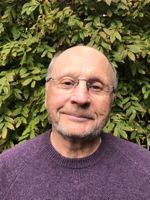
Symbiosis
by John Schneider
John lives in the Wildcat Creek watershed near Tilden Park in Berkeley, California.

A flotilla of seabirds casts off from the sloping
palms of this crescent shoreline like
white kerchiefs rising brightly
with the wind over the surging swells
along a South Pacific horizon, then vanish
into a landscape of faint green mist.
They scout the ragged sea-top for this
bounty of small silver fish boiling
to the surface to escape
the bellies of bonitos below.
This chaos of wings and hunger guides
the fishermen who skipper their trawlers
each morning to a place with no land in sight.
And as they return to that drier home that’s not
really home anymore, the birds follow to fill
themselves with gutted castoffs, then roost
in the open hands of trees, awaiting another sunrise
© John Schneider
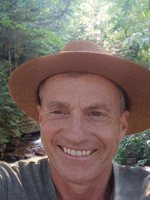
Mirror Lake
by Phil Harford
Phil resides in the Great Bay watershed of the Seacoast region of New Hampshire, the ancestral homeland of the Penacook-Abenaki people. Grateful that a plan for a massive oil refinery at Great Bay was blocked in 1974 through the efforts of three remarkable women, Phil enjoys hikes through preserved forests and saltmarshes and nearby ocean beaches.

It was half a century
before I returned
to Mirror Lake,
where the water
was so clear
I was sure I swam
airborne
and could see
the scales on the sunfish
as I floated overhead,
though maybe it was the sunfish
that were floating over me
since above and below were
one in the same
and each cloud and tree
was as perfect in the mirror
as it was in the sky.
But now I stand on the shore
and the water looks murky
like a memory that has grown old
and tries to remember the way
it used to be
before time spoiled
the pure spaces
and above and below were
two separate places.
© Phil Harford

Trail of the Monarchs
by Daniel Brennan
Daniel lives on the west side of Manhattan, his apartment on a tucked-away side street pummeled by winds coming off the Hudson River. In the turn of spring, the scent of brine and algae becomes a perfume along the highway where he spends his mornings biking downtown.
You’ll never see them, so let me tell you:
Flickering mottled orange and black
springing forth from beneath milkweed leaves,
dreamcatcher wings.
I wish you could stand in awe as their tongues plead
for nectar, gathered around
unfurled blooms like children around a sprinkler in the dead of July.
I wish
you could understand
the peril of their journey, spanning continents;
filigree limbs carrying them from one half-haven to the next
over the choke of building gray in the air.
They will be long gone, we know this now.
By the time you can speak their name, the Monarchs
will have lost their way. No passage to speak of, the winds
will be thick with perfume that sends them to their graves.
They don’t have long to tell their story, so neither, then, do I.
I wish you could know that wonder
when a rogue butterfly finds bare skin, finds an oasis in you,
child of my child, decades from now.
I need you to know that even in this sinking heat we leave behind,
it was only ever about pushing on; forgive me for following this road
we’ve built until I could not follow it any longer, a final migration.
You’ll never see them, so let me tell you. They’re dancing on
the stretch of lawn my parents discovered decades ago that, in decades to
come, will be a palimpsest, a memory. Let me tell you:
I wish you could know the peace I knew: Summer,
that flicker, light cast gently on the milkweed leaves.

© Daniel Brennan
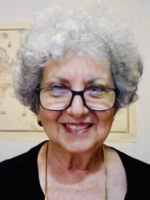
Ode to the Little Brown Bat (myotis lucifigas)
by Joan Mazza
Joan lives in Mineral, Virginia, very rural, in the woods at the end of a long driveway.

Once I saw you every evening where the sky
opens above the pond and drain field.
Your distinctive jerky flight and wing beats,
wide wingspan for such a small mammal.
I left a light on, a dinner bell drawing insects.
You are said to eat your weight in flying pests
in one night, to live ten years. Farmers love you
for your natural ways, better than pesticides.
Come back and pollinate our fruits and flowers!
With white nose syndrome your population
crashed. Ninety to ninety-nine percent gone
some say. Your bones, fragile as toothpicks,
line the floors of caves. How many of you
will bring your kin back to flourish again?
Where are those of you immune to this fungus?
Find each other! Breed! I’ve built a house
for you on the sunny side of a white oak.
Come back. I’ll leave the light on.
© Joan Mazza
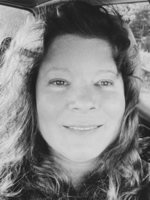
Brigid, Earthbound
for my Irish ancestors
by Jenevieve Carlyn Hughes
Jenevieve lives close to the Long Island Sound and a couple of miles from a nature preserve with acres of coastal forest, sand dunes, and salt marsh. Located near the Hammonasset River, the area is a critical stopover site for migratory birds.
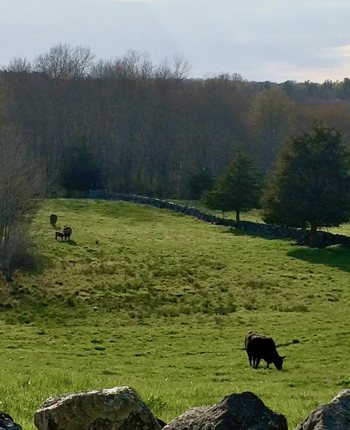
If we come into being through our longing,
find me in meadowsweet
where Kerry cows are lowing
in the dappled light. If a flower
is as much a flower
scrambling up a roadside holler
as bee-hopping in a prairie,
I exist somewhere beyond the pages
of an old book of pastoral poetry
or a treatise on bovine veneration,
materializing most fully in the presence
of those musty, living creatures
with their warm hides & gentle ruminations,
folding themselves into the field
before the coming of rain.
© Jenevieve Carlyn Hughes
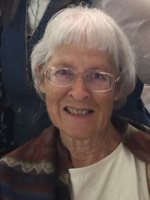
Rise, Shine
by Ellen Roberts Young
Ellen lives on the edge of the valley cut by the Rio Grande through the Chihuahuan desert as it approaches Mexico and Texas.

Sun lightens the bushes,
sings with the tall grasses,
strikes the ugly cactus
to no effect; no magic can
make a prickly pear smile.
Another cloudless day:
people out walking
will retreat as the sun,
beaming now, grows
hot, heavy and friendless,
taxing as an accountant
at his desk, unable
to soften the harsh news
of our overspent reserves.
© Ellen Roberts Young
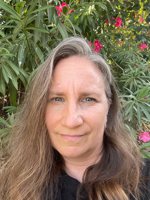
All Used Up
by Maria Zafonte
Maria lives at the edge of the Phoenix Mountain Preserves in the northern part of the Sonoran Desert where she conserves as much precious water as she can from the Colorado, Verde and Salt Rivers.

Roughly 300 million years ago, as this area we now know as Phoenix rose not from the ashes but from the ocean, underwater volcano flows pushed the tops of the Phoenix Mountain Preserves above the sea. Phoenix is encircled by these formerly submerged mountains today, though water is in shorter supply here now, unless you count the dots of blue swimming pools behind every house and the expanses of green golf courses visible from the plane window on an approach to Sky Harbor Airport. Some of these mountains have topographically descriptive names, like Moon or Camelback. Others are more geographic in nature, such as North and South, which ring the Valley on what used to be the—you guessed it—north and south extremes of the city, and now are more aptly the center of the endless sprawl that spreads on and on in each direction to support the 55,000-odd people who decided to call this desert metropolis their new home last year.
Shaw Butte is one of these Phoenix mountains and was one of the first peaks of lava to emerge from their volatile watery origins. This 2149-foot peak stands sentinel over the mundane chores of my comparatively insignificant life, looming in front of my window as I do dishes. When I grab the mail, I can sometimes hear the crunch of gravel under the tires of the utility vehicles as they climb the windy road to maintain the many cell towers perched atop the butte, sharing the trail to the summit with hikers.
On the eve of the summer solstice, I hike the initial quarter mile ascent of Shaw Butte. It is a steep and steady climb, and my breath is heavy as I rest on a rocky outcropping on the side of the mountain. The sun is low in the sky, large and shrouded in an orange glow. The sun itself is barely distinguishable from the corona of rays taking up the horizon. This red-orange, dispersed sunset is due in part to the distant wildfires raging in the north, giving rise to a smoky, low-hanging haze that colors the surrounding ring of mountain ranges shadowy blue-gray-purple all along the horizon.
It is hot —117 degrees of hot, a record-setting temp for this day in June—but with the sun low in the sky, the air is no longer skin-scorching, just heavy and oppressive. A strong wind kicks up occasionally and whips at the brim of my hat, threatening to send it up the trail. The blast of air buffets my ears, subsiding, then kicking back up without warning. Some gusts are strong enough to whistle through the nearby dry brittlebush plants and grasses, green from meager spring rains just two months ago, but now yellow-brown like dried tufts of unkempt, dirty blonde hair scattered among the basalt rocks on the side of the mountain. With such wind, there is an anticipation of relief, of some kind of cooling sensation, but instead there is just hot suffocating air, occasionally whipping up mountain dust that pricks at your eyes, despite squinting away from the gusts. The scattered creosote bushes are still covered in their withered yellow flowers and dried out cotton puffs. Their tiny oily leaves that produce the “smell of the desert” that is so distinct when it rains here, sway in the wind, scentless in the current unrelenting drought and heat of the Sonoran Desert.
As the sun continues to sink in the sky, lower, lower, almost but not quite ready to dip below the White Tank Mountain range far to the west of the Valley, it turns from orange to a pink orange like a grapefruit squeezing its ruby juice into the surrounding sky before the final descent. The golden cast on my skin is fading, and the sun—slowly, slowly then all of a sudden—sinks behind the mountains leaving behind a pink glow against the hazy gray blue of the distant mountain range, a true western sunset.
As I soak in the last of the day, I am reminded that just a little way up the trail ahead of me lie the archeological ruins of the Hohokam people who lived in this place half a millennium ago. At this time of year, one day before the solstice, I imagine the ancient Hohokam, their name often translated as “all used up,” climbing to the outcropping further up the trail where petroglyphs of swirls and dots remain among the damaged and graffitied rock, the ancient and sacred hidden among the modern and profane. These ruins are thought to map out rooms of a ritual sacred space where the longest day of the year was acknowledged to mark time and to signal the beginning of the saguaro fruit harvest. Is it possible that the Hohokam watched the sunset in this very same place before they disappeared from the earth? How long before unending drought and infernal heat forces modern Phoenicians to join the Hohokam in becoming ghosts who once roamed these ancient mountains, a modern-day people who are also all used up.
© Maria Zafonte
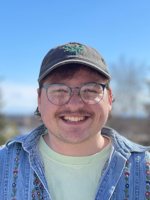
As Long As We Have Windows
by Zeke Shomler
Zeke lives and writes within view of the Alaska range on the unceded lands of the Dena people of the lower Tanana River. At this time of year, he'll be enjoying the Arctic midnight sun.

Pay attention to the source of light.
As long as we have windows
for birds to fly into,
birds will fly into them
and they will crumple on the sidewalk below,
twitching with snapped necks.
Look up: see how the sun
illuminates its feathers and passes
through the window like
unremarkable magic. Despite all
that we have done, despite all who we have
wronged—the white rhinoceros,
the jaguarundi, the thylacine—ourselves—
despite the casual and daily destruction,
the tangle of feathers and hollow bone
shimmering on hot asphalt—
despite the terror, the sun
is a source of warm light
and there is always, somewhere,
despite the worst of our
transgressions,
something shining.
© Zeke Shomler
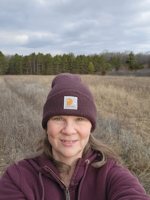
Finding the Solace Outside
by Cynthia Edmonds-Cady
Cynthia lives in the wide-open spaces and rolling farm fields of central Illinois, where she runs a small sheep and wellness farm using regenerative, organic methods. Her little farm on the prairie is surrounded by tall white pines and spruce trees, and her watershed is Kings Mill Creek, a small stream that flows into the middle fork of Sugar Creek, which continues to the Mackinaw River along steep ravines and newly restored prairie oak savanna.

As a trauma survivor, fleeing from abuse, I found solace in the world outside, the natural world. Being close to nature, living in a wild place near the beautifully cold deep waters of Lake Superior and the pine forests that surround it, feeling connected to woods, rivers, lakes, wildlife, and other animals, saved my life. Leaving my past, my trauma, would also mean leaving my savior, the Northern wilderness that I called home. But in moving to the wide-open prairies of the Midwest, I learned to listen to the grassland whisper. Lying down along the banks of the numerous snaking rivers that border miles and miles of farmland here, I heard the slow murmuring of the waters comforting me. Healing happened in earnest when I started a small farm of my own here and began to vibrate along with the cycles of life and death in nature rather than within the anticipation of explosions of human violence.
But life, especially a life lived close to nature, brings both joy and pain, as the following narrative of my last lambing of the season here on my small sheep farm illustrates. Although being outside on the land, in the natural world, is comforting, there is also difficulty and suffering there. No life is ever completely free of suffering. Those of us who live closely connected to nature are granted both the beauty and the curse of seeing up close the cycle of life repeated, continuously experiencing both birth and death, on the farm, in nature, all around us. We are also the ones who find comfort in this cycle, in the world out there, beyond the window, beyond the door. We are the ones who find our solace outside.
That Night in the Barn
The first thing I remember is the pungent stench of sheep urine. That smell will linger, stinging my nostrils for days.
As I sit on the straw bedding in the stall in the hot, humid air, flies biting my bare legs, Evelyn lies next to me in the lambing jug, straining and grunting with nothing to show for it.
It has been hours since her labor started. We have gone from the intense heat of sunset into the dark cooler air of dead night. But still, she has nothing to show for it except a tiny bit of a water bag that she simply cannot push out.
She will not hold still for me to do an internal exam, so I call my daughter to come sit this lambing vigil with me.
Thankful to have someone else there in the barn, I put my daughter to work right away. “Hold her tighter,” I yell, as the ewe bucks and tries to run off. My soapy fingers are barely able to fit inside to check her. Where are the lambs? Why can’t I get all the way in? She is not progressing. Not properly dilated. Just felt a water bag, but she is not able to push it through. Something is wrong.
Something is very wrong.
Calls in the middle of the night to the vet, to other shepherds. “Just wait,” they tell me. “Sounds like she is taking her time because she’s a first-time mother. Just wait,” they say.
So we sit.
So we wait.
As I walk up to the farmhouse in the middle of the night to get a glass of water and a brief respite, I notice how the lights from inside the barn reflect off the pinecones high up in the giant Norway spruce outside. Beautiful dancing slivers of light.
The path between the house and the barn is well-worn, dark and lonely at 3:00 am, lit only by my headlamp. As I walk with my head tilted downward, this small circle of light shines on the grass casting eerie shadows. I think of the spring night when the previous ewe lambed and my headlamp illuminated night crawlers jumping over the grass. A sign of life perhaps?
There is no such sign tonight.
Back in the barn, the flies bite my ankles as I sit and wait. The acrid smell of sheep urine is so strong down here in the soiled straw bedding. I tried to freshen it up, earlier in the day, added more straw, but the heat, god, this heat is unbearable. Why is she lambing so late? Why did the ram not breed her earlier with the rest of the ewes? Must be my fault. Must be my mistake.
I’m tired now, tired from being awake so long, tired from feeling helpless in the face of life…death…beginnings…endings. So many endings.
Powerless. I feel powerless. I pray. I pray that she will push the water bags and the lambs out on her own. I pray that they will all live and be healthy. I pray, and I put my fingers inside to try to help her dilate. I pray and I watch helplessly as she does not progress. She pushes but nothing comes. She sleeps. Her contractions slow down. They stop.
I drift off to a semi-sleep, my head against the barn wall. I picture myself floating on a raft down a lazy river, slowly passing pine trees and wildflowers along the banks. I want to stay there in that vision, stay on that raft floating along without fear, without pain, without death, without loss. I want to stay there, but something is wrong. She is not progressing,
I call the vet again. It’s 4:00 am. He will be here. It might be a C-section. Hope is fading.
They all might die.
I cannot do this anymore. My heart hurts. Too much loss.
So much loss and grief over a lifetime. How can I continue?
He brings his chains to pull legs. It’s not working; he’s having a hard time. The lambs are tangled up, two of them with legs mixed up and heads turned backwards and twisted around each other.
They must have been tangled together the whole time, a boy and a girl, a ram and a ewe lamb, impossibly entwined. Poor Evelyn could never have pushed them out.
The vet yells for me to get the other puller. I run to the farmhouse and get the noose that pulls heads. That is what it reminds me of: a noose. He tries to put it around the head of the closest lamb. Its neck is frozen in a bent-backwards and turned-to-the-side position. He can’t make the head move; it stays frozen.
The sound that a ewe makes while you reach inside to try to save her and her lambs is an awful sound.
Evelyn screams with pain.
I hold her head still and talk to her while the vet keeps reaching, reaching, grabbing, grabbing, further and further, but the lamb keeps slipping.
Finally, he gets the noose around the lamb’s neck and gets the head to move, elongated and in position, so it can be pulled out. The chains go on its hooves, which are pointing out at the same time, and finally, finally, he is able to guide and pull the lamb’s head and feet together to get it out.
Off to the side this lamb goes. No heartbeat. It’s dead. Then he reaches in to pull the second one. No heartbeat. It’s also dead.
The ewe is alive but torn, hurt, sore. She gets a shot, another shot. Then she is set free. Finally.
Free.
She stands still in shock, eyes wide. The eyes. Always the eyes know. Her eyes told me in the middle of the night that something was wrong. Her eyes told me that she could not push this out, could never push this mess out, the tangled sad mess that was a black ram lamb and a reddish ewe lamb. Her eyes told me.
But I could not do it. I could not help her. I did not get the vet here soon enough. Maybe. Maybe it did not matter. She was doomed. These lambs were doomed. They were already doomed from the beginning.
So much doom in my life.
She bred late; she lambed in the high heat of summer, the sun setting, the hottest time of day; she acted unsure, restless, moving from lambing jug to pasture back and forth all day. Then at night she tried, the lambs tried, but they just could not do it. They were not alive for long. They were not meant to be alive for long.
Waste. Such waste. Such loss. Such death. Such sadness.
The rain is coming down now in the early light of dawn. I drag the two dead lambs to the burial site.
There is no ceremony.
No prayers. No sadness. Just exhaustion. Failure. Disgust. Letting go.
I let go.
I let go of the fear from the night; I let go of the expectations from the day before; I let go of the guilt; I let go of the pain; I let go of control; and I let go of the weight of trying to be someone that I am not.
I turn my face upward and let the warm summer rain wash me clean.
Although my story of the last lambing of the season exemplifies the inescapable reality in nature of death, loss, and darkness, it also embraces nature’s beauty and renewal. The light glinting off the pinecones, the grass glistening in the beam of my headlamp, the soft light of dawn breaking, and a warm rain shower, all brought beauty and healing to my experience. Our encounters with loss, grief, fear, or sadness over the course of our lives, are mirrored in the cycles of death in nature, as are our joyful moments of life, rebirth, and renewal. For those who are connected to nature, there is beauty and healing in both the darkness and the light if you are willing to see it. The lesson is one of letting go so that you can see more clearly. Coming to understand that we humans ARE nature, that we exist within these cycles of birth, death, blossoming and destruction, can help lead us on a path towards interconnectedness, and towards finding our own solace outside.
© Cynthia Edmonds-Cady
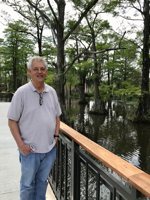
Being There
by Ronald J. Pelias
Ron recently retired from the University of Louisiana where the cypress trees stand like old wise men with their moss beards hanging almost to the level of the waiting water. Alligators and turtles gather together at their base seeking the comforting sun.

Wind rocks the oak tree
in my backyard, gentle
as the moss swinging
from its broad shoulders
and thin fingers. The bare
ground beneath, damp
from a hard overnight rain,
seems rich, ready
to welcome new life.
A few fallen branches
rest in the bare dirt. Soon
they will begin to rot
become a home for some
small creature, one
I probably will never see.
The eager sun insists
that the leaves glisten.
Each one turns into
a small mirror of light.
My neighbor’s roof
is beginning to dry.
His honeysuckle, in full
bloom, hangs over
the old fence. Beyond
the mourning dove’s echo,
there is a calm.
I brought the paper
out to read, but it sits
on the table next to me,
still wrapped in its plastic bag.
The morning is already full.
© Ronald J. Pelias
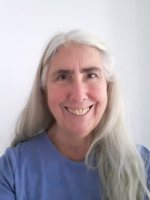
Idyll
by Regina Weiss
Regina lives a short walk from the Hudson River estuary in Brooklyn, New York, where she begins most days watching all kinds of life in her tiny garden. She is happy to be surrounded by migratory birds, venerable trees, racoons, possums, woodchucks, skunks, red tail hawks and bald eagles.

When Shoshana won that first election her breastbone and then her clavicle sopped up the violence, the stomping, whistling, clapping caldron she found herself immersed in; she felt the whisper of too many balloons released from the ceiling net brush strands of hair across her ear as they fell to confuse her ankles, but all she heard was the sultry gravel of her grandmother’s voice, that lifelong touchstone for whatever was right in the world. Thereafter, whenever she was tempted to succumb to the ethic-numbing, soul-deflating effects of political life – self-important donors, self-serving colleagues, distraught constituents she couldn’t help – Shoshana pulled herself together by listening for Nana Grizelda’s counsel, offered in her pebble-inflected cello of a drawl.
Grizelda had died a decade ago in the garden at Shoshana’s parents’ house on a dry hot summer day inflated with insect hum and bird call. She’d died reclining on her back in a bed of salt hay, under patches of sharp blue sky framing the downturned heads of a half-dozen Giant Russia sunflowers she’d planted months earlier that were ready to be cut down, soaked, dried, roasted, and consumed.
When Shoshana went out to the garden that day and saw her grandmother’s body, a sharp, surreal moment of awe caught her breath in a suspended shriek and held it deep in her chest against her belly, leaving her unable to move or make a sound. When the moment had passed, she instinctively got down on the ground to stretch out alongside her Nana there in the garden as she had done so many times for as long as she could remember, the hay grinding softly beneath her earlobes as it cradled her head, the starched sleeve of her grandmother’s dress rustling dryly as Shoshana reached for the old woman’s hand, disturbing the stack of painted banyan-wood bracelets that always encircled her grandmother’s dusty arms. The smooth clicks of wood on wood so startled Shoshana that for a moment she believed she’d been mistaken, that her Nana was merely asleep although, of course, she knew better from the countless afternoons and midnights she’d shared her grandmother’s bed. The older woman never slept in silence. How many times had Shoshana been thrust up from sleep horrified that a train or a truck was about to wipe her out, only to realize it was her grandmother’s labored breathing that so startled her? No, Grizelda would be silent only in death.
Settling deep into the warm hay now, Shoshana sought to gather what would have been Grizelda’s last moments with the world, wondering which of its details had most engaged her. She rubbed the straw and earth beneath her as the old woman would have caressed it with her own back, head, and limbs as she expired.
During those final moments had she gotten lost in the bright rippling greens of maple and ash at the far end of the garden? In the ochre-edged sunflower petals cupping cragged cushions of black-striped seeds waving in the foreground of this brilliant blue sky?
When Grizelda’s eyes finally closed, did she still smell her surroundings and treasure the scent of hay and compost and plant breath fading into August for a few lovely moments before leaving her body and its pleasures behind?
What was her very last sensation? Was it the sun's warmth on her body, its light filtering through the thin moist shades of her eyelids, or a breeze playing with her dress hem, tickling her knees?
But no, Shoshana thought, the cynosure would have been Nana’s most beloved vibration, the one she herself noticed now as she fully focused on channeling the woman whose flesh lay beside her. The raucous frenzy of peepers from the ancient black cherry at the far end of the deep yard was gathering still, growing richer, louder, faster, thicker, concentrating the pounding of Shoshana’s heart at the back of her throat. She closed her eyes, reaching for the sound with each cell, urging her being to wholly enter the crazed synchronistic singing of the morning peepers chirping out their blissful lust, gratitude for the very existence of the tiny frenzied invisible amphibians washing over her. After a long, long listening, she opened her eyes and glanced at Grizelda’s silver swatch of tangled hair, her deeply carved forehead.
Thus Shoshana’s last visit with her grandmother was completed, lying together one last time in the garden Grizelda had planted when her granddaughter was born and had tended ever since, all the while teaching Shoshana and her brother everything she knew about plants, about the order of the world, which was a great deal.
Shoshana’s father was so pissed. He’d been so careful to say there was no emergency, to avoid the disturbance of sirens entering the day, still the ambulance barked once, twice, as it drew into the circular drive of the low slung house. The medics thrashing around in the corn, knocking over the sturdy stalks of the Russian Giants while trying to position a stretcher next to the corpse had drawn a crowd of neighbors. Aaron Ramirez was certain to his core that his mother had died out there in the yard deliberately, just to embarrass the family.
Shoshana didn’t try to reason with him. Her Nana had known how to love without reservation. That ability had somehow bypassed her children but had become her greatest gift to Shoshana and all her other grandchildren. So as her father quietly ranted, Shoshana kept listening to her grandmother’s voice. “Take all that you know and begin,” Grizelda told her.
© Regina Weiss
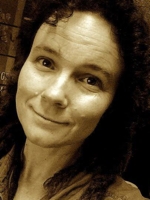
Mandy Finds Her Place
by Wren Tuatha
Wren Tuatha is a climate refugee, having escaped the ongoing fires of California for the Cayuga watershed of the New York Finger Lakes.

surveys a plot on her land—
her place in the burn where she
can hammock her soul again;
her place she now marks
with a green wicker chair.
Mandy can name grasses ponding
her place beneath cauterized scrub oak.
Her place had goats and working dogs,
most lost that day, with tribes of trees
and her house on Yankee Hill.
Her place and all of us in the forge.
I want to tell her story,
how Mandy is made of iron.
Last year, on a stony dirt road
at her place, half in
and half out of her truck
when the brakes gave up,
Mandy went with it,
slow motion, into the gulch,
dogs thrown around the cab.
Dogs ran. She crawled
to find help, broken
like a shoveled snake.
At home she grew new bones,
her place a slope for goats.
Never heard her scream.
Mandy at the forge.
From her place
she still looks for Isis,
her favorite Akbash dog,
missing since the fire.
Her place germinating
wicker, her place
a flagpole for ghosts.
First published in San Pedro River Review.
© Wren Tuatha
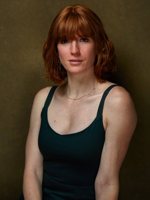
Cardinal
by Christine Gentry
Christine lives between the schist outcroppings of Marcus Garvey and Central parks and the flowing waters of the Harlem and Hudson rivers. Her favorite neighbors are a gnarled, 250-year-old elm and--of course--a red cardinal that often visits the linden tree outside her window.

When I was five, my father built a pigeon coop in our backyard. It had cubbies where they could nest and a chicken wire bay window where they could see the world while they pecked at seeds and throat-pumped tiny gulps of water.
At the top of the back wall was a small entrance guarded by thick, hanging wires that gave when pushed from the outside but locked when pushed from the inside. Whenever Daddy opened the front door, a cooing cloud of pigeons would rise into the trees and settle onto the power lines, where they would stay until called in by the metallic sound of him dumping seeds into the feeder. They’d rush in a descending swarm through that little entrance and shove each other to get to the fattest seeds. I loved watching them through the chicken wire.
I don’t remember them dying. They must have. Or maybe they just stopped coming back. One day we had a full pigeon coop, the next we had a shed. Daddy put a freezer in there and made toolboxes of the cubbies.
One day, my mom asked me to get some ice cream from the freezer. When I opened the shed door, a flash of red flew out of a cubby and ricocheted off the front wall, coming to rest in the far corner of the bay window. A cardinal, trapped by the one-way door. I don’t know how long he’d been in there, open-beaked and gasping.
I approached him, slowly. He burst into another frenzied panic, hitting every wall, somehow missing the open door. When he landed again, he was on the floor in the corner nearest me. Exhausted and resigned to death, he allowed me to scoop him into my palms.
A warm, soft ball of fast breaths and indistinguishable heartbeats, he turned his head to the side and fixed one wet, black-rimmed eye on me—unblinking and eerily human. I stood there with him in my hands, stunned by his beauty. I finally turned and walked through the front door.
At the first sight of sky, he exploded into flight, disappearing into the tangled branches of our cottonwood tree, raining summer snow into my hair.
© Christine Gentry